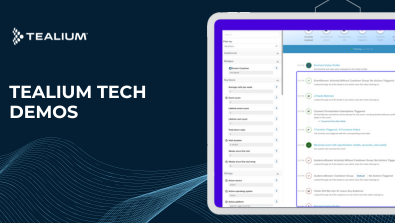Starting a CDP project is no small task, as it will impact the entire customer experience and the departments responsible for managing that experience. As we discussed in our previous post, choosing a CDP can be a complicated task with so many vendors to evaluate.
To help you out, we’ve created a list of fifteen of the most important questions for you to ask internally and of your prospective vendors before starting a CDP project.
Questions to Ask Internally Before Starting a CDP Project
1. Do more than 10 customer data sources exist in your organization today (ex. Web, social, mobile app, IoT, servers, CRM systems, help desk systems)?
Most companies have a wide assortment of customer data sources, but they often are siloed. These silos keep teams from working together to create a seamless customer experience— that’s the ultimate promise of the CDP.
2. Does your organization use more than ten different MarTech vendors (e.g. Facebook, Mailchimp, Optimizely, Adobe, Salesforce, Invoca, Leanplum, etc.)?
Today’s marketers and analytics professionals are building best-of-breed tech stacks to stay competitive. A data-first CDP takes a vendor-neutral approach and enables seamless data flow to power a unified experience.
3. Does your CDP need to serve both marketing and the rest of the organization that touches on the customer experience?
CDPs have largely been relegated to the MarTech stack, but the customer experience— and the data associated with it— extends far beyond the marketing department. It’s important to bring in the necessary stakeholders, like marketing, analytics, data, customer success, etc., to ensure the CDP will work to improve the customer experience across all touchpoints.
4. Is your IT team spending cycles on ETL processes or integrating different channels, apps, and data sources together?
Today, companies without a CDP who want the benefits of unified customer data are forced to do manual processes to import and export data from channel to channel and build ad-hoc integrations. Understanding how a CDP will impact this work is an important part to realizing the full value of the technology.
5. Are your analysts and data science teams spending more than 20% of their time in data wrangling processes or data preparation?
Just because you have data doesn’t mean it is usable. Data scientists can spend up to 80% of their time prepping data. A CDP collecting and standardizing from all sources before data enters your systems ensures these teams spend less time preparing and more time analyzing.
6. Do additional lines of business (customer service, analytics, IT, finance, operations) need to leverage correlated customer data in their tools and processes?
Most people view CDPs as a marketing technology. But the customer experience doesn’t stop at the marketing team. A data-first CDP allows you to build a data foundation for the entire customer lifecycle by creating a unified way to gather and disseminate all the data your company has on a customer.
7. Are you concerned about your organization’s ability to audit your customer data and comply with ever-changing data privacy regulations?
Of course you are! But governing and controlling all of the sources and outputs for customer data without a CDP requires labor-intensive work from IT. A data-first CDP provides an auditable trail of data from creation through transformation to activation, reducing the amount of work needed to govern your data’s quality and keep it secured.
Questions to Ask Prospective CDP Vendors Before Starting a CDP Project
8. How is data collected and who owns that data?
Now more than ever, companies need to take control of their data, but too often it’s born in a silo (that you may or may not control). Creating a single view of the customer is difficult if your CDP provider doesn’t give your company the ability to collect and own data from every channel and source in your technology landscape. If you don’t own the data, how can you ensure compliance and the future of that data? Your chosen CDP solution should transform all of your customer data into first-party data that you control.
9. What’s the legacy of the company’s CDP offering? Is this CDP technology built natively, or bought through acquisition?
Today’s CDP landscape is huge— but not all of the vendors are made equally. Some CDP vendors built CDPs in house to seamlessly bring together the data from all your company’s sources; other CDP vendors have been built through the acquisition of other technologies to produce a CDP offering. The latter, as a result, can create a cumbersome— rather than unified— approach to customer data, often reliant on exorbitant services to make things work.
10. How many data sources will this CDP enable me to collect from?
Your CDP should be able to collect data from anywhere and everywhere, whether it’s through tags, APIs, SDKs, JavaScript, webhooks, and file imports, covering both the client-side and server-side. Tealium uniquely brings an enterprise tag management system and API Hub that— like our CDP— is vendor-neutral and leaves you in control of your customer data, wherever its found.
11. Does it integrate into the tools that I’ve already invested in?
The value of your CDP is limited by the number of technologies it can integrate with in your tech stack. You’ve already invested significantly into many key technologies— if it can’t work with all of these technologies in a unified fashion across every department, all you’re achieving is a slightly bigger silo.
12. Does your CDP come with tools, product features, and services to meet the robust privacy data regulations and standards unique to your geography and industry?
Privacy and trust are key components of your brand. Customer data is becoming increasingly regulated and consumers are increasingly aware of how their data is handled— or mishandled. Ensure your CDP vendor takes security and compliance as seriously as you do! Look for privacy certifications like HIPAA, PCI, SOC 2 Type II, Privacy Shield Framework, ISO and other best-in-class security and privacy controls.
13. Can your organization keep pace with the real-time requirements of new technology like facial recognition and IoT?
The future of the customer experience is going to be driven by new technologies— which means new sources of data and new ways to use that data. These new technologies are changing consumer expectations. They will demand a real-time customer experience.
With a data-first CDP provider that allows you to create a vendor-neutral, independent data layer gives your organization the agility to meet these new requirements. That way you don’t get stuck on someone else’s technology roadmap.
14. Is it reliable and scalable?
Customer data is one of the most valuable assets for any enterprise company. Even a tiny blip in uptime can create problems in compliance and personalization when that data gets delayed or lost. Make sure your vendor can meet your global and regional data center needs and has a proven track record of reliability and availability.
While downtime is a big concern, one area that doesn’t get discussed enough for foundational technologies like a CDP is the pain and costs associated with ripping it out and replacing it. Choosing a data-first CDP that can scale and grow with your business without needing to be replaced as you expand into new geographies or increase how much data you’re processing.
15. Are Machine Learning capabilities on their roadmap— and yours?
Over the next few years, Machine Learning is going to transform much of how businesses are run. Customer Data Platforms are a prime area for Machine Learning to address some of the biggest challenges companies have in real time.
Looking for more help? Contact us today to see how our data-first approach can help you when starting a CDP project. Or you can read through our blog or resources for more great content to help you decide.






